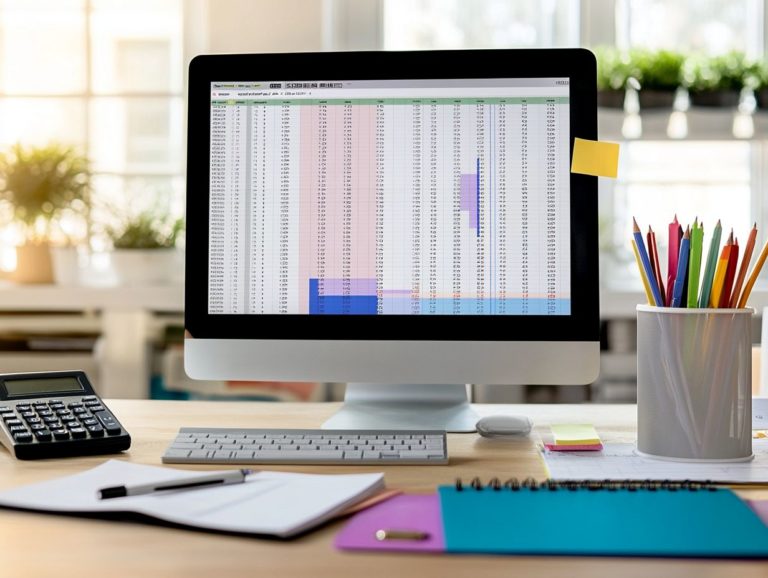How to Use Budgeting Worksheets Effectively
Budgeting transcends mere numbers; it serves as an important tool for securing stability and cultivating peace of mind in your financial life.
This article delves into the significance of budgeting and introduces various types of budgeting worksheets designed to streamline the process for you. You will discover a step-by-step guide to creating your very own worksheet, along with tips to ensure its effectiveness.
As you navigate this journey, you ll be made aware of common pitfalls to avoid, and you’ll explore how to seamlessly integrate long-term financial goals into your budgeting strategy.
Whether you are embarking on your budgeting journey or aiming to enhance your existing approach, this guide empowers you with essential insights to take control of your finances.
Contents
- Key Takeaways:
- The Importance of Budgeting
- Types of Budgeting Worksheets
- How to Create a Budgeting Worksheet
- Tips for Using Budgeting Worksheets Effectively
- Common Mistakes to Avoid
- Using Budgeting Worksheets for Long-Term Financial Planning
- Frequently Asked Questions
- What are budgeting worksheets and why are they important?
- How do I start using budgeting worksheets effectively?
- How often should I update my budgeting worksheets?
- Can budgeting worksheets help me save money by analyzing expense categories and using budgeting apps?
- What are some common mistakes to avoid when using budgeting worksheets?
- Are there any digital budgeting worksheets available on platforms like Microsoft Office or PNC Bank?
Key Takeaways:

- Budgeting is essential for financial stability and should be a priority in managing personal finances.
- There are various types of budgeting worksheets available, with different formats and budgeting apps to cater to individual needs.
- Creating a budgeting worksheet involves following a step-by-step guide and can be customized to incorporate long-term financial goals and savings.
The Importance of Budgeting
Budgeting plays an important role in achieving financial stability. It enables you to track your income and expenses accurately, which is essential for managing your personal finances.
By establishing a budget, you can set clear financial goals and analyze the way money moves in and out of your finances, maximizing efficiency. A thoughtfully crafted budget gives you the power to recognize spending patterns, manage savings and investments wisely, and make informed decisions that bolster your long-term financial health.
It acts as a roadmap for adjusting your spending, ensuring that you meet your financial objectives while effectively addressing both regular and changing expenses. In this manner, budgeting becomes a formidable tool for realizing your money goals.
Why Budgeting is Essential for Financial Stability
Budgeting is crucial for achieving financial stability, as it offers you a comprehensive overview of your income and expenses. It gives you the power to manage your cash flow accurately.
By dissecting your spending habits, you can uncover recurring financial patterns that may have previously eluded your notice, leading to more informed decisions. Effective expense management not only curbs wasteful spending but also directs funds toward your essential needs and aspirations.
This disciplined approach ensures that your savings and investments consistently align with your long-term financial goals, ultimately cultivating a sense of control and readiness for both anticipated and unforeseen financial challenges in your personal finances.
Adopting budgeting as a regular practice fosters a healthier relationship with money, setting the stage for a future marked by stability and prosperity as you learn to manage your expenses effectively.
Types of Budgeting Worksheets
You have a wealth of budgeting worksheets at your disposal, each crafted to elevate your financial management skills according to your unique needs and preferences. With tools like Excel and Google Sheets, you can access customizable templates that let you track income and expenses across various categories, providing a clear visual representation of your financial data.
The versatility of these worksheets allows you to tailor your tracking methods to align with specific financial goals, whether you’re looking to review your performance monthly, quarterly, or yearly. A user-friendly worksheet can simplify the intricacies of managing your personal finances, making budgeting not just accessible but truly effective.
Different Formats and Tools Available
A variety of budgeting tools and formats are at your fingertips. Options range from spreadsheets in Excel and Google Sheets to specialized budgeting apps that simplify keeping track of what you spend.
These options cater to your unique preferences and needs, offering an organized approach to managing your finances. Digital spreadsheets allow you to create customized categories and formulas, enabling you to fine-tune your budgeting strategy to fit your lifestyle perfectly.
Budgeting apps also offer a user-friendly interface packed with features like automatic synchronization with your bank accounts, real-time alerts for your spending habits, and insightful analytics that empower you to monitor your expenses effectively while you pursue your financial goals.
Whether you lean toward traditional methods or embrace modern technology, these tools enable you to take charge of your financial health, ensuring you make informed decisions. Take charge of your financial health today!
How to Create a Budgeting Worksheet

Creating a budgeting worksheet involves a series of methodical steps designed to enhance your financial management. Start by gathering all relevant data, including your income streams whether it s your salary, rental income, or freelance earnings.
Next, list your fixed and variable expenses, like utilities and credit card payments. Once you have this information, categorize your income and expenses to paint a clear picture of your financial landscape.
Leverage formulas and calculations within your worksheet to automatically update totals. This enables you to analyze spending patterns and adjust your financial strategy as needed. This method makes your budgeting worksheet powerful.
Step-by-Step Guide
To create an effective budgeting worksheet, follow this detailed guide designed to enhance your financial tracking process and ensure it remains easy to update.
Begin by meticulously assessing your income sources. This will help you grasp your total cash flow, which is the cornerstone of any solid financial plan. It s essential to include every form of income, from your salary to side gigs, ensuring you have a comprehensive view of your financial landscape.
Next, categorizing your expenses provides clarity on where your money is flowing, allowing you to make informed decisions about discretionary spending. This organization can uncover patterns that you might otherwise overlook.
Incorporating formulas for calculations like total expenses, savings goals, and remaining balance not only boosts accuracy but also facilitates insightful analysis of your financial health. With each step, you’ll find the budgeting process becoming more manageable, giving you the power to make confident financial choices.
Tips for Using Budgeting Worksheets Effectively
Using budgeting worksheets effectively involves understanding and applying essential strategies that can elevate your financial management experience. Start by regularly reviewing your worksheet to ensure it accurately reflects your current financial situation, allowing for adjustments to your budget as your life circumstances evolve.
Make it a priority to promptly update your income and expenses, ensuring you always have a clear grasp of your cash flow. Use the tracking period to analyze your spending patterns and assess whether you’re making headway toward your financial goals.
By embracing these strategies, you can fully harness the advantages of your budgeting worksheets and maintain control over your finances, ultimately paving the way for a successful budgeting plan.
Maximizing the Benefits of Budgeting
To maximize the benefits of budgeting, you need to master the art of tracking and analyzing your financial data effectively. This goes beyond simply recording your income and expenses; it involves regularly reviewing and categorizing them to uncover valuable insights into your spending habits.
By breaking down your financial activities, you can spot patterns that might need adjustment. Using different apps and tools can streamline this process, allowing you to visualize exactly where your money is flowing.
Setting specific financial goals fosters commitment and instills a sense of accountability. By making timely adjustments based on your analysis, you ensure alignment with those goals, helping you navigate unexpected expenses and ultimately paving the way for a healthier financial future.
Common Mistakes to Avoid
Identifying common budgeting mistakes is essential for effective financial management and can help you avoid unnecessary pitfalls that impede your financial progress.
Many overlook the importance of accurately tracking all income sources and expenses, resulting in an incomplete financial picture. Failing to set realistic financial goals can derail your budgeting efforts. Neglecting to regularly update and review your budgeting worksheets can also hinder your progress.
By being aware of these common mistakes, you can navigate your financial journey with greater confidence and effectiveness while implementing the 50-30-20 rule, a simple budgeting method that allocates 50% of your income to needs, 30% to wants, and 20% to savings or debt repayment.
Pitfalls to Watch Out for

In terms of budgeting, being aware of certain pitfalls is essential for effective financial management. Your success hinges on recognizing these missteps.
One common mistake is not adequately tracking your income and expenses using spreadsheet tools. This often leads to underestimating or completely overlooking your actual spending habits.
Many individuals set lofty financial goals that appear enticing at first but can ultimately lead to frustration when they struggle to achieve them. This disconnect may result in discouragement, causing you to abandon the budgeting process entirely.
Neglecting to review your budget regularly means you might miss significant changes in your financial situation, including your cash flow and spending patterns, leaving you unprepared to adapt to new challenges or seize opportunities. Staying vigilant and proactive is crucial to maintaining control over your financial destiny.
Using Budgeting Worksheets for Long-Term Financial Planning
Using budgeting worksheets is a smart way to take charge of your financial future! By consistently tracking your income and expenses, you can pinpoint areas ripe for savings and investment, enabling you to allocate your financial resources with precision.
A meticulously maintained budgeting worksheet serves as your roadmap for future financial decisions. This ensures you can prioritize your aspirations and make necessary adjustments as your circumstances change.
This proactive approach to personal finance through regular updates and adjustments cultivates a deeper understanding of your financial health. It supports sustained progress toward long-term financial stability through effective budgeting and investments.
Incorporating Goals and Savings into Your Budget
Incorporating financial goals and savings into your budget is essential for achieving long-term financial success by managing your expenses and savings. By setting clear objectives, you can align your spending habits with your desired outcomes, ensuring that every dollar serves a purpose.
Using budgeting worksheets allows you to categorize your expenses, making it easier to pinpoint areas where you can maximize savings. This approach not only clarifies which financial goals are within reach but also instills a sense of accountability in your financial journey. For a more efficient method, learn how to use spreadsheets for budgeting.
Regular tracking enables you to make adjustments as needed, adapting to any changes in priorities such as fixed and variable costs or income. Ultimately, integrating these strategies fosters a proactive approach to managing your finances, paving the way for a stable and secure financial future.
Frequently Asked Questions
Start your budgeting journey today and explore additional resources to help you succeed!
What are budgeting worksheets and why are they important?
Budgeting worksheets are tools used to plan and track your finances. They help you visualize your income, expenses, and savings by using categories in tools like Excel or Google Sheets. This way, you can make informed financial decisions.
How do I start using budgeting worksheets effectively?

Start by gathering all your financial information, such as salary and rental income.
Input this information into the appropriate categories in the budgeting worksheet. Be realistic and accurate with your numbers.
How often should I update my budgeting worksheets?
Update your budgeting worksheets at least once a month. This keeps you on track and allows for necessary changes during your monthly review.
Can budgeting worksheets help me save money by analyzing expense categories and using budgeting apps?
Absolutely! You’ll be amazed at how quickly you can boost your savings! Budgeting worksheets help you find areas to cut back on expenses and increase your savings. They also allow you to set specific savings goals and track your progress.
What are some common mistakes to avoid when using budgeting worksheets?
Common mistakes include not being realistic with your calculations and not updating your budget regularly. Review your budgeting worksheets periodically and make adjustments as needed.
Are there any digital budgeting worksheets available on platforms like Microsoft Office or PNC Bank?
Yes! Many online tools and apps offer digital budgeting worksheets. These are convenient for tracking your finances on-the-go and often come with features like automatic categorization of expenses.





